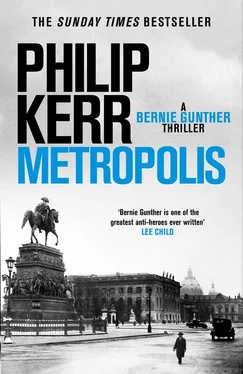‘Exactly,’ said another man.
‘That’s certainly what he’d like you to believe,’ I said. ‘Only, I do wonder why he sent his letter only to a Jewish-owned newspaper. So far as we know, none of the other papers has received it. And let’s face it, gentlemen, it’s not like he’s preaching to the choir here. I imagine none of you believes in ridding this city of disabled beggars at the barrel of a gun.’
‘No, of course not.’
‘So I’d say he sent this letter to you because you printed the article by Bernhard Weiss and because you’ll believe this latest letter was written by a Nazi. And because it suits your agenda to print a murdering Nazi letter, doesn’t it? But you should ask yourself this: Do you think the Völkischer Beobachter or Der Angriff would publish this letter? Or any of the newspapers in the Hugenberg publishing empire?’
‘That’s a fair question,’ said Wolff.
‘And what’s the answer?’
‘I suspect they would not publish it.’
‘You’re not a Nazi yourself, are you, sergeant?’ asked Wolff.
‘I guess you didn’t understand my joke about Landsberg Prison.’
‘It’s only that you seem a little anxious for us to believe it might not be a Nazi who wrote the letter.’
‘Anxious, no, sir. I want the truth, that’s all. The first letter contained no references to Bernhard Weiss’s Jewishness. Which for a Nazi shows a degree of restraint that’s hardly typical.’
‘He’s got a point.’
‘This new letter mentioned his Jewishness only once. And not in any really poisonous words, which would be more usual.’
‘What are you saying, sergeant?’ asked Wolff.
‘I’m not sure, sir. Right now all I have are questions and not enough facts. That kind of journalism might be good enough for Der Angriff , but not for the newspapers I like to read.’
‘I’m just the theatre critic,’ said a bald, horse-faced man with a Charlie Chaplin moustache. This was Alfred Kerr, perhaps the most famous writer working for the Tageblatt . ‘But in answer to your question about what I’d like to write about this fellow, Shakespeare teaches us that a man like this is probably someone who’s been disappointed in life. Who’s fallen short of his own expectations. Who desperately wants significance and power. Above all I should say this is a man who knows how to hate. Motiveless malignancy, as Samuel Taylor Coleridge put it when talking about Iago in Othello . Yes, there’s your problem, sergeant. Quite possibly this man has no real motive. It may be that he is someone who simply enjoys wickedness for its own sake. I’m afraid you may be dealing not just with the mystery of whodunnit but with the mystery of life itself.’
I scratched my head and nodded. ‘Thank you, sir. I’m certainly glad I asked.’
On my way back to the Alex I stopped in at the Berlin Fire Department to see the chief fire commissioner, Walter Gempp. He was a genial, helpful man of about fifty whose modernization of the fire department and public allegiance to the left-leaning German Democratic Party made him a natural ally of men like Grzesinski and Weiss. Gempp was accompanied by Emil Puhle, the senior fire chief at Linienstrasse and, effectively, Gempp’s second-in-command.
‘I asked you to come and see me because I heard from Waldemar Klotz that you’d been asking him questions about the Wolfmium factory fire.’
Klotz was the fire chief of Company 7, in Moabit. After what Angerstein had told me about the Wolfmium factory fire, I’d telephoned him to ask if there was any evidence of arson.
‘That’s right, sir.’ Reluctant to mention that my information about the fire had come from a Berlin gangster, I decided to make less of my interest than there was, especially as I hadn’t yet shared these suspicions with Gennat or Weiss.
‘Might I ask why?’
‘You might say it was a routine inquiry. With at minimum fifty workers dead, I just wanted to check that there was nothing in it for the Murder Commission. Which there would be if there was any evidence of arson.’
‘Yes, of course. Well, we’ve found nothing that raises any cause for suspicion. Nothing at all. Our investigating officers are convinced that the fire started in a faulty electrical switchboard. Once the fire got hold, there was every chance of it becoming a disaster. Osmium, which is used in the production of light bulbs, has an oxide — osmium tetroxide — that is extremely flammable. It also produces a highly toxic gas, which is what killed all those people. Indeed, several of my own officers are still recovering in hospital after sustaining respiratory tract injuries. Thirty years after the Schering company fire in Wedding, this city still does not have enough breathing respirators, despite the fact one of my predecessors, Fire Chief Erich Giersberg, died as result of that fire.
‘I will say this, Gunther, as someone who is often publicly associated with the DDP, I care very much about the safety conditions for workers in this country. And the workers at Wolfmium were no exception, in spite of their being mostly Russians and Volga Germans. So anything you yourself discover that gives me cause for believing there was any criminal negligence would be of great interest to me.’
‘I understand, sir.’
‘For example: I have a relation who’s a broker at the Berlin Bourse. And he tells me that in recent months Wolfmium had lost a large contract to Osram, one of their major competitors. And that, before the fire, the price of shares in Wolfmium had halved. I mention that because the Hamburger Fire Insurance Company has just settled the factory owners’ claim in the amount of more than a million reichsmarks. Which more than compensates for any losses the owners might have sustained on the stock market. Obviously it’s not the sort of thing I’m able to investigate myself, but someone in the police might very well conclude this alone could constitute grounds for further investigation. Wouldn’t you agree?’
‘Yes, sir. I would.’
I wasted the rest of the day interviewing a few of the men who’d been inspired by Bernhard Weiss’s article in the Tageblatt to claim that they were Dr Gnadenschuss. It was hard to believe Ernst Gennat had been wrong regarding the wisdom of Weiss in writing a newspaper article about the Gnadenschuss murders. I doubt that the Holy Inquisition would have accepted the confessions that came in, and my instinct was to call the lunatic asylum at Wuhlgarten and have these men taken away in straitjackets so that they might be subjected to the old tried and tested cure, which was a half-hour under a fire hose. The only one of these time wasters who struck me as sane was the youngest and probably the strangest.
Just fifteen, Sigmar Gröning was a pupil at the Leibniz Gymnasium on Wrangelstrasse, which was about a ten-minute walk from where Frölich’s crippled body had been found. He was one of a group of schoolboys who’d discovered the body. Gröning had white-gold hair, pitiless grey eyes, a high forehead, a rather self-satisfied, sneering mouth and a prominent chin. He was wearing a tailored black jacket, black knickerbockers, long lace-up black boots, a stiff white collar and tie, and a naval-style black cap with a small shiny peak that probably resembled his soul. Bloodless, coldhearted, straight-backed — he was likely everyone’s idea of a fallen angel.
Unlike the others I’d questioned, he at least had done his homework and knew all the details of what had been printed in the first letter to the newspapers. In fact, he knew almost as much about the Gnadenschuss killings as I did. But it was immediately obvious to me that he hadn’t killed anyone; just as obvious was the fact that he would have liked to kill someone, probably anyone would do. I’d looked enough murderers in the eye to recognize what was lurking inside this young man’s skull. After half an hour in the company of this ruthless little monster, I wondered where the country might be going if this was a sample of its youth. I tried to envisage Gröning in ten years’ time and concluded that in all probability I was talking to a future lawyer, assuming I didn’t throw the book at him for wasting police time.
Читать дальше












